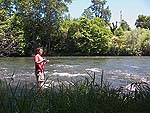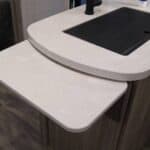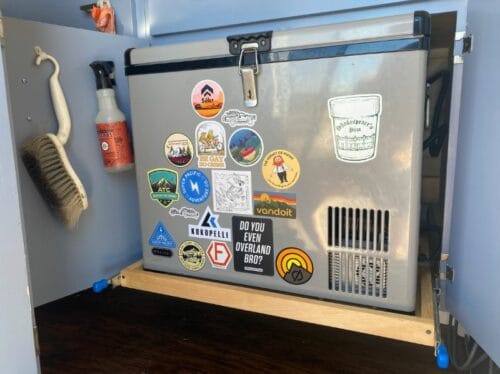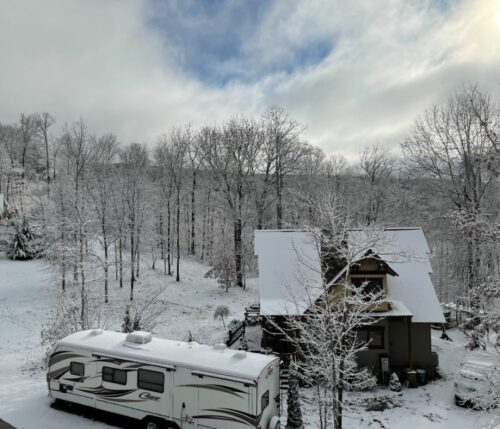Lessons Learned
- Moisture inside an RV will condense in cold weather, if not controlled.
- Condensation can produce enough water to cause damage in walls and ceilings.
- Reduce moisture by running exhaust fans and dehumidifier while showering and cooking.
- In cooler weather (under 45° for our trailer), it may be necessary to always leave a small window or vent opening.
- In freezing weather, check areas of the RV that receive minimal circulation for signs of condensation. An air circulating fan will help in these areas.
Living in an [an error occurred while processing this directive] requires attending to certain tasks that permanent foundation houses do not require. One such task is to keep the air moisture level low enough to avoid condensation. Moisture control is easily accomplished with roof vents and a dehumidifier, and just as easily forgotten.
We bought our [an error occurred while processing this directive] in July in Texas. All summer and well into fall, both air conditioners ran full blast, doing their best to beat the scorching heat. By the time cool weather set it, we have completely forgotten about keeping moisture under control. In hot weather the air conditioners removed excess moisture from the air, evidenced by the constant trickling of water from the roof.
On a winter night as we got in bed, I happened to run my hand against the wall by the edge of the mattress and felt wetness toward the center. This immediately got my attention and I pulled the mattress out to investigate. From the slight discoloration on the edge of the composite wood base, I could tell that enough water collected on the wall to run down and soak into the wood a few inches from the wall. The previous day we had the RV washed and my assumption was that high pressure water was forced up through the [an error occurred while processing this directive] bottom, where caulking is not as abundant.
To prove my washing theory, I continued to check the wall for many days after. First the moisture decreased, then it completely went away, giving me the impression that I was right. After a couple of weeks of checking and finding a dry wall, I made a mental note not to spray water under the bedroom slide while washing, and thought no more of it.
Then the weather turned rainy. One night during a heavy rain I thought about checking the wall to see if the leak is still a problem. Sure enough, the wall was wet again. For days leading up to this, the thunderstorms were heavy, blown by strong gusts. As before, I assumed that there is a leak on the bedroom slide.
When the weather dried out, I made an appointment to take the trailer in the shop for re-sealing. A couple of other minor items had to be looked at during the same visit, such as the sagging paneling on the bedroom ceiling. The shop re-caulked around the bedroom slide as I have asked, then informed me of what they thought the problem was. According to them, there was no leak at all, only condensation. As they pressed the ceiling panel into place, there was enough water collected on it to run down on their heads.
As they explained how condensation collects in cool weather, especially in well-sealed fiberglass units like ours, the instructions given to us by the dealership in July came back to me. The shop gave us the same solution: Run the ceiling fan during showering or buy a dehumidifier. Also run the fan on the stove hood to expel moisture caused by cooking.
Even though we caught this problem early and the damage was negligible, it scared us how easily we have forgotten about condensation. Immediately we went looking for a dehumidifier and modified our showering habit to include opening the vent and running the fan. Running the fan seemed to have solved the moisture problem, but we wanted the added security of a dehumidifier.
None of the local stores we checked carried dehumidifiers in winter, so we turned to the Internet for our search. We found quite a few larger units intended for houses and for RV’s in storage. Most of these RV dehumidifiers were larger than we wanted and required to be set on the counter with a hose in the sink.
At last we found the WindChaser Mini Dehumidifier on Amazon. This is a very small, portable unit, made for tight spaces—perfect for a [an error occurred while processing this directive]. It is self-contained so it can be placed anywhere there is an electrical outlet. It can hold up to one quart of water in its clear container, through which the water level can be easily seen and dumped into a sink, when full.
The WindChaser provided another benefit which we weren’t expecting—a steady humming noise to help us sleep better. Because of its sound masking and moisture removal qualities, we run it almost every night. In the year and a half we had it, it has continued to work flawlessly, needing only an occasional dusting of the removable filter.
Being such a small unit, the dehumidifier removes moisture at a relatively slow rate. To keep moisture under control, we still run the exhaust fans while we shower and cook. These two solutions used in concert eliminate condensation inside our trailer when the temperature is above 45°. When it gets cooler, condensation starts forming again in a few trouble spots where circulation is limited, such as the corners by the bed and the far corner of the closet. Below 45° we leave a small opening in the bedroom ceiling vent day and night.
Did you also buy an RV in warm weather? Learn from our mistake and prepare for the inevitable condensation in cooler weather by making it a habit to run the ceiling fan while showering, and buying a dehumidifier while they are still in season.
Original founder and writer for Changin' Gears. Former full-time RVer!
-
Charlie Kerekeshttps://changingears.com/author/charlie-kerekes/
-
Charlie Kerekeshttps://changingears.com/author/charlie-kerekes/
-
Charlie Kerekeshttps://changingears.com/author/charlie-kerekes/
-
Charlie Kerekeshttps://changingears.com/author/charlie-kerekes/










